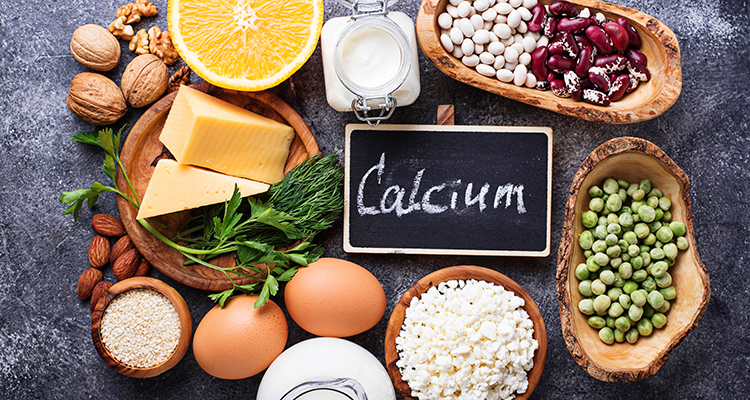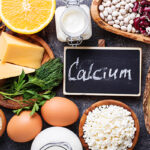The Best Vitamins for Sleep
It’s no secret that getting the right vitamins and nutrients in your diet is imperative for your overall health and well-being. But certain vitamins work better to support certain bodily functions, including sleep. Whether you’re struggling with insomnia or another sleep disorder or simply want to improve your sleep quality, certain vitamins can help.

In this article, you’ll discover the best vitamins for sleep including natural supplements that you can easily incorporate into your daily regime and reap their many benefits.
Content
The Connection Between Diet and Sleep
You may be wondering exactly what role your diet plays in achieving a good night’s sleep. Truth be told, it’s more important than most people realize. Certain things are considered common knowledge. For example, consuming caffeine too close to bedtime could leave you tossing and turning all night. Or going to bed on a full stomach could cause gas, bloating, and heartburn. But beyond these basic principles, your body needs certain vitamins and nutrients to function properly. A balanced diet promotes both physical and mental health – two components that directly affect your ability to achieve quality sleep.

So before you reject the idea that your diet could be the cause of your sleep troubles, keep reading. If your diet is significantly lacking in any of the following vitamins, it could be negatively affecting your sleep quality.
Vitamin D
You probably know that your body naturally absorbs vitamin D from the sun, but did you also know that it plays an important part in promoting healthy bones, supports immune function, reduces inflammation, and helps regulate your mood? Lack of vitamin D in your diet can not only impact these bodily functions but may also trigger sleep disturbances in some people.

Research suggests that vitamin D impacts now only how much sleep you get but also how well you sleep. One study linked a vitamin D deficiency with shorter sleep duration. The same study also found a connection between low vitamin D levels and insufficient sleep, especially among individuals aged 50 and older. Unfortunately, studies show that at least 50% of adults consume a diet lacking in vitamin D.
Scientists at Qingdao University in China conducted further studies on the connection between vitamin D and sleep. Their results indicated an obvious connection between low vitamin D levels and both lack of sleep and poor sleep quality. But the evidence doesn’t end there. Lack of vitamin D can also put you at greater risk of developing a dangerous sleep disorder known as sleep apnea. If you already suffer from OSA (obstructive sleep apnea) insufficient vitamin D levels may worsen symptoms. It’s also interesting to note that the connection between OSA and vitamin D is interconnected. Sleep apnea patients who consistently use a CPAP (continuous positive airway pressure) machine saw a significant increase in vitamin D levels, plus improved sleep quality.
Your body’s sleep-wake cycle (circadian rhythm) also plays an important part in how well you fall and stay asleep. Certain healthy sleep habits like limiting exposure to blue light at night and following a sleep schedule can help balance your circadian rhythm. And studies suggest that sufficient levels of vitamin D can help with this as well. One study showed that higher levels of vitamin D help to activate two circadian clock genes in the body, which also control your sleep-wake cycle. This makes sense considering the sun is one of our main sources of vitamin D and light exposure helps keep your sleep cycles in sync.
The most efficient way to increase your vitamin D levels is to increase sun exposure. When your body is exposed to sunlight, it naturally produces vitamin D. This is one reason some scientists consider vitamin D more of a hormone than an actual vitamin. But if sun exposure isn’t enough or you prefer to get your vitamins from the foods you eat, you can up your daily intake of eggs, fatty fish, and certain juice and dairy products.
Vitamin C
One of the most widely recognized natural supplements, vitamin C is a powerhouse of antioxidants that’s most commonly associated with a strong and healthy immune system. But the benefits of vitamin C don’t end there. It’s also an essential vitamin for heart health, healthy bones, teeth, and skin. Vitamin C also helps your body produce collagen.

But what about the connection between vitamin C and sleep? By boosting your immune system, vitamin C also helps prevent serious health risks that could ultimately impact your sleep quality. Similar to vitamin D, getting enough vitamin C could help improve the symptoms associated with OSA including improved sleep and fewer nightly episodes. Combined with vitamin E, vitamin C may also decrease daytime sleepiness and improve overall sleep quality. This combination of vitamins may also combat memory loss caused by sleep deprivation.
Low levels of vitamin C are also linked to shorter sleep duration. A 2013 study conducted at the University of Pennsylvania found that participants who slept less than 6 hours per night also had a vitamin C deficiency. These low levels were also linked with more frequent sleep disturbances and an increased risk of certain sleep disorders including obstructive sleep apnea.
One of the biggest risk factors associated with sleep apnea is heart disease. Studies show that people with undiagnosed sleep apnea may also develop metabolic problems (including obesity) and high blood pressure. OSA can also cause circulation issues in some people. Research shows that an increase in vitamin C may help prevent the complications associated with OSA while also improving symptoms and reducing stress caused by the condition itself.
Most people associate vitamin C with orange juice and that’s probably because citrus fruits are one of the best natural sources of vitamin C. Other foods that will boost your vitamin C levels include kiwi, strawberries, broccoli, cauliflower, kale, brussel sprouts, green and red chilis, and spinach.
Vitamin E
Next up on the list of alphabetical vitamins for sleep is vitamin E. This vitamin is an important and often overlooked antioxidant that promotes healthy cell function while also protecting them from damage. Vitamin E gives your immune system a boost, helping to combat illness and ease sleep troubles in some people. Vitamin E’s main function in the body is to protect its primary functions. It works to protect against memory impairment caused by lack of sleep, prevents sleep apnea, and protects important hormones needed for achieving quality sleep.

Memory loss and cognitive decline are two of the most common symptoms associated with chronic sleep deprivation. This is because sleep plays an integral role in your brain’s ability to process and store information and formulate memories and important neurological connections. During REM and slow-wave sleep, your brain processes all of this information. The fewer hours you sleep, the less time your brain has to organize these thoughts and pieces of information. This can impact both short- and long-term memory function.
The antioxidants found in vitamin E can protect against this deterioration and promote healthy brain function. One study showed that this vitamin worked specifically to reduce memory impairment caused by sleep loss. It’s believed that vitamin E protects the function of the hippocampus – the area of the brain where memory consolidation occurs. This is supported by evidence that long-term sleep deprivation disrupts hippocampus function and activity.
Getting enough vitamin E in your diet may also help reduce your risk of developing sleep apnea or experiencing severe symptoms associated with this dangerous sleep disorder. In combination with vitamin C, vitamin E can help improve sleep quality in those with OSA while also improving nighttime breathing. Vitamin E is also linked to maintaining healthy hormone levels, primarily testosterone. Sleep deprivation can cause dips in testosterone levels. Vitamin E works to protect and even increase these levels.
Vitamin E can be found in a variety of delicious foods including almonds, peanuts, hazelnuts, and sunflower seeds. You can also up your levels by upping your intake of tomatoes, broccoli, and certain oils including corn, soybean, and wheat germ.
Vitamin B12
You’ve likely heard of people getting B12 infusions or shots to boost their immune systems, but did you know that this vitamin also plays an important role in sleep quality? It’s also linked with healthy brain function, a healthy heart, DNA activity, and the formation of red blood cells.

One study suggests that levels of B12 are directly linked with your body’s ability to regulate its natural sleep-wake cycle. Research shows that B12 promotes a balanced circadian rhythm. Some sleep specialists believe that individuals with a B12 deficiency are more likely to suffer from insomnia while others argue that high levels of the vitamin may actually trigger sleep disturbances and result in shorter sleep duration. Because there are conflicting reports on the effect B12 has on sleep, you should consult with a doctor before adjusting these levels in your diet in the hopes of improving sleep quality.
Another interesting fact about B12 is the impact it has on mental health, mainly depression. There is a notable correlation between depression, lack of sleep, and disrupted sleep-wake cycles. Most people with depression find it difficult to maintain a healthy and consistent sleep schedule, therefore, disrupting your body’s sleep-wake cycle. Studies suggest that B12 can help balance your circadian rhythm and, in turn, ease depressive symptoms and reduce your risk of developing serious depression. More research is required to make any definitive claims about B12 as a viable treatment for depression.
The best natural sources of B12 include dairy products, eggs, meat, shellfish, fish, and other animal protein. You can also consider B12 shots if your body struggles with absorbing this important nutrient.
Vitamin B6
Not as widely recognized as B12, vitamin B6 is equally as important for most bodily functions, including sleep. B6 supports a healthy immune system, plus boosts cognitive function and development. Studies indicate B6 may affect dreams and act as a natural sleep aid.

The human body naturally produces a variety of important chemicals and hormones that affect sleep including melatonin and serotonin. Melatonin is your body’s natural sleep hormone, whereas serotonin is a chemical that promotes feelings of happiness, calm, and relaxation. Low levels of vitamin B6 have been associated with dips in both melatonin and serotonin levels as well as an increased risk of depression and insomnia. Not only do these hormones impact your ability to achieve quality sleep but they also play an important role in mood regulation. In one study, older adults who consumed higher levels of B6 were at a lower risk of depression and other mood disorders.
Some research suggests that higher levels of vitamin B6 are linked to lucid dreaming. The more B6 in your diet, the more likely you are to experience these vivid dreams. Lucid dreaming involves being fully aware of being in a dream, without being fully awake or asleep. Not everyone is capable of lucid dreaming and some people try a plethora of techniques to try and achieve this phenomenon. The Australian University of Adelaide conducted a study in 2018 that indicated an increase in dream recall for those participants that took vitamin B6 supplements.
Incorporating more vitamin B6 into your diet is relatively easy. This nutrient is found in bananas, milk, eggs, cheese, fish, whole grains, potatoes, carrots, and spinach. Just keep in mind that high levels of B6 in the blood can actually be toxic so avoid taking a supplement and also adding more B6 into your diet. In rare cases, excessive levels could also trigger insomnia in some people, having the opposite intended effects.
Magnesium
Magnesium supports hundreds of processes in the human body, from heart health to brain function and yes, sleep. Studies suggest that magnesium can help to reduce anxious thoughts and stress at night by quieting the mind and relaxing the muscles, making it easier for you to fall asleep. One reason for this is the effect that magnesium has on melatonin production. By increasing melatonin levels in the body, magnesium works to relax your brain and body, inducing sleep.

When shopping for a magnesium supplement, you may notice that many are already combined with other sleep aids and sleep-inducing ingredients including melatonin and glycine (more on this in a minute). You may find the most sleep benefits by combining magnesium with melatonin and even B6. This combination has been accredited with treating all forms of insomnia, regardless of the cause. Other studies indicate that magnesium increases levels of GABA (gamma-aminobutyric acid) in the brain, which sends signals to the body to induce a sense of calm. This means that a diet lacking in magnesium could cause prolonged sleep troubles and even chronic insomnia.
But you don’t need to have insomnia to enjoy the sleep benefits provided by this vitamin. By increasing your magnesium levels, you can also maximize both the quality and quantity of your current sleep. For example, older adults taking a magnesium supplement reported falling asleep faster and with less trouble than those who took a placebo. One thing to consider is that most of these studies were performed on older adults who tend to have lower magnesium levels anyway. There’s still ongoing research on the effects of magnesium on healthy, younger adults who have normal magnesium levels.
The most effective way to incorporate more magnesium into your diet is through a supplement. You can also get it from dark, green leafy vegetables, whole grains, low-fat yogurt, and dried beans and legumes.
Calcium
When most people think of calcium, they think of strong bones and teeth. And while milk (and calcium) do a body good, there’s more to this vitamin than just strong bones and healthy teeth. Calcium can actually improve sleep and help promote healthy sleep cycles – particularly the REM state of sleep.

REM sleep is the deepest sleep stage and it also lasts the longest. During this time, your eyes move rapidly behind closed eyelids (hence the name), your heart rate increases, and you experience irregular breathing. Your brain waves also become more variable as your muscles become partially paralyzed. Your brain is also hard at work during this stage of sleep sorting through information, storing memories, and making important neurological connections.
Calcium helps your body utilize an essential amino acid called tryptophan. You’ve probably heard of this as the key ingredient in Thanksgiving turkey that triggers sleepiness. That’s because tryptophan has sedative effects that help ease your body and mind into a state of sleep. Without enough tryptophan, you may find yourself feeling restless and experiencing more periods of wakefulness.
Incorporating more calcium into your diet is relatively easy. It’s the main component of most dairy products including milk, yogurt, and eggs. It’s also found in salmon, sardines, and most leafy green vegetables.
Potassium
Potassium is another essential vitamin that supports healthy REM sleep. Whether you find it difficult to fall asleep initially or find yourself waking periodically throughout the night unable to fall back to sleep, a potassium deficiency might be to blame. Although slightly outdated, a 1991 study published in the Journal of Sleep concluded that potassium has a direct effect on this deep stage of sleep that your body needs to repair and restore itself. Low levels of potassium were linked with frequent awakenings during the night.

Potassium also works in combination with the essential nutrient magnesium to deliver deeper, more restorative sleep. The best natural source of potassium is bananas, but you can also find this vitamin in leafy green vegetables, beans, avocados, and baked potatoes.
Other Vitamins for Sleep
While the above-mentioned vitamins are accredited most often for improving sleep, they’re not the only ones. By upping your intake of the following vitamins (or finding a supplement that combines these vitamins and others), you can increase your chances of getting a good night’s sleep.

Glycine
Glycine is an amino acid that interacts with the body’s nervous system to perform numerous functions. One such function is improving sleep. The exact way glycine works is still being studied, however, research suggests that the amino acid helps lower body temperature at night, signaling the body that it’s time for sleep. One study showed that participants who consumed 3 grams of glycine before bed experienced less fatigue in the morning than those who took a placebo. Other notable benefits include a more focused mind and increased energy levels.
Another study conducted in 2007 measured participants’ heart rates, brain waves, and breathing patterns during sleep. All individuals involved were experiencing poor sleep at the onset of the study, but those who took 3 grams of glycine before bed showed a measurable improvement in sleep quality and reduced the time it took for them to fall asleep. Glycine may also improve daytime performance in sleep-deprived individuals.
Glycine is sold as a powder and can easily be added to water for consumption. Check with your doctor for the recommended dosage amount, though .8 grams per kg of body weight per day appears safe for most individuals. You can also increase your daily intake of foods containing glycine including fish, dairy products, legumes, and meat.
Melatonin
It’s no secret that a melatonin supplement can improve sleep and ease insomnia symptoms. After all, it is the body’s natural sleep hormone. With increasing levels, many people find it easier to fall and stay asleep. You may also find yourself feeling calmer and more relaxed before bed, without fewer anxious thoughts or anxiety over not achieving quality sleep.
Your body naturally increases and decreases melatonin levels throughout the day, with higher levels spiking at night as the sun sets and your body prepares for sleep. During the day, when you’re exposed to sunlight, your body produces less melatonin, helping you stay awake and alert. This is one reason why blue light from digital devices is so harmful to your body’s natural sleep-wake cycle. It confuses your brain into thinking it should be awake, when in fact, it’s time for sleep. Other things like jet lag or shift work can disrupt melatonin levels, making it increasingly difficult to adopt a healthy or consistent sleep schedule.
There are countless melatonin supplements on the market and sleep aids that list melatonin as an ingredient. Speak with your doctor before incorporating more melatonin into your diet.
Valerian Root
When it comes to natural vitamins and supplements for sleep, nothing works quite as well as valerian root. Native to Asia and Europe, valerian root is used as a natural way to treat myriad conditions including depression and anxiety, symptoms associated with menopause, and sleep troubles. One study showed that participants that took 530 mg of valerian root for one month noticed an improvement in sleep quality, duration, and latency.
Although valerian root is one of the most common sleep-inducing herbal supplements used in both the United States and Europe, the evidence backing these claims is still ongoing.
Boost Your Vitamin Intake and Improve Sleep Quality
There’s no secret pill to treat insomnia or guarantee deep, restful sleep. But by incorporating these natural vitamins into your diet, you can help reduce symptoms and side effects that may be impacting your ability to get a good night’s sleep. For example, reducing anxious thoughts, increasing relaxation, and lowering the risk of certain conditions that can trigger insomnia including heart disease and sleep apnea.

Are you looking for more tips and tricks to improve sleep quality? Check out the rest of our blog!



















